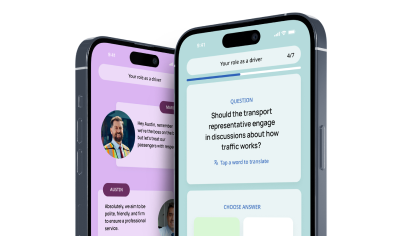Deskless workers require a different approach to training and engagement. They are not confined to an office space or a set schedule and often work in demanding and dynamic environments. To maximise their potential, organisations must provide them with the necessary tools and resources to thrive.
Deskless workers, such as field service technicians, retail employees, and healthcare professionals, play a crucial role in various industries. They are the frontline workers who directly interact with customers, provide essential services, and represent the face of the company. Due to the nature of their work, many deskless employees often face unique challenges that traditional office-based workers may not encounter.
Organisations need to understand the specific needs of deskless workers to ensure they are adequately supported and engaged. This may involve providing mobile-friendly training materials, implementing communication tools that cater to on-the-go employees, and offering flexible scheduling options. By investing in the development and well-being of deskless workers, companies can enhance productivity, customer satisfaction, and overall employee morale.
Let's cover 10 tips for training and engaging deskless workers.
1. Tailor training to the mobile environment
Unlike their deskbound counterparts, deskless workers rely heavily on mobile technology to perform their jobs. Therefore, it is essential to design training programs that are accessible and mobile-friendly for deskless workers. Interactive mobile apps, videos, and online modules can be utilised to deliver training material that can be accessed anytime, anywhere.
Mobile learning, also known as m-learning, has revolutionised how training is delivered in various industries. With the increasing use of smartphones and tablets, organisations are leveraging these devices to provide on-the-go training to their employees. This approach not only enhances accessibility but also promotes continuous learning and skill development.
Furthermore, incorporating gamification elements into mobile training can make the learning experience more engaging and effective. Organisations can motivate employees to participate in training activities and actively retain relevant information by adding game-like features such as quizzes, challenges, and rewards. This gamified approach increases employee engagement and fosters a competitive spirit that drives performance improvement.
2. Utilise microlearning techniques
The days of day-long training sessions are long gone. Due to their fast-paced work environment, deskless workers tend to have shorter attention spans. Embrace microlearning by breaking down training content into bite-sized modules that can be completed on the go. This approach ensures that information is easily digestible and retained for future use.
Microlearning is a modern and practical approach to training that fits perfectly into the busy schedules of deskless workers. Employees can engage with the material more effectively by delivering content in short, focused bursts, leading to better retention and application of knowledge in their daily tasks. This method also allows for greater flexibility, as workers can access training modules whenever they have a spare moment, whether during a break or while commuting to work.
3. Implement flexible scheduling
Recognise that deskless workers may have unpredictable schedules and accommodate their needs. Offer self-paced e-learning options that allow them to complete training at their convenience. Organisations can support their employees' work-life balance while promoting engagement by providing flexibility.
Flexible scheduling is crucial to modern workforce management, particularly for industries with deskless workers, such as retail, healthcare, and hospitality. Understanding employees' unique challenges without fixed working hours is crucial in fostering a positive work environment. By implementing flexible scheduling policies, businesses can demonstrate their commitment to supporting staff members in achieving a healthy work-life balance.
Furthermore, offering self-paced e-learning options caters to the needs of deskless workers and enhances their learning experience. Individuals can progress through training modules at their own pace, absorbing information more effectively and applying it more confidently to their roles. This approach benefits the employees regarding skill development and contributes to overall organisational productivity and efficiency in-office employees.
4. Foster a culture of continuous learning
Encourage deskless workers to adopt a mindset of continuous learning and growth. Emphasise the importance of staying current with industry trends and provide opportunities for ongoing development. This can be done through regular webinars, conferences, or even mentorship programs.
Continuous learning is essential in today's fast-paced world, where industries are constantly evolving and new technologies are emerging rapidly. By fostering a culture of continuous learning within your organisation, you equip frontline employees and your deskless workers with the skills they need to succeed in their current roles and prepare them for future opportunities and challenges.
One effective way to encourage continuous learning is to create a knowledge-sharing environment where employees can exchange ideas, best practices, and lessons learned. This can be facilitated through internal forums, lunch and learn sessions, or cross-departmental workshops. By promoting a company culture full of collaboration and knowledge sharing, you empower your deskless workers to learn from each other and foster a sense of community and teamwork within your organisation.
5. Leverage Augmented Reality (AR) for training
Augmented Reality (AR) technology can revolutionise training for deskless workers. By overlaying digital information in the real world, AR enables interactive and immersive learning experiences. AR can enhance engagement and knowledge retention through training simulations and equipment maintenance guides.
Imagine a scenario where a new employee in a manufacturing plant is being trained on how to operate a complex piece of machinery. Instead of flipping through pages of a manual or watching a video tutorial, they can wear AR glasses that guide them through each step in real time, highlighting the relevant parts and providing instant feedback. This hands-on approach accelerates the learning process and reduces the risk of errors.
Furthermore, AR can be utilised for remote training sessions, allowing experts to guide field technicians or service engineers from different locations. Through live AR annotations and visual cues, the remote expert can troubleshoot issues, demonstrate procedures, and offer real-time support, improving efficiency and reducing downtime. This interactive and personalised training level is invaluable in the transportation and manufacturing industries, where precision and safety are paramount.
6. Enhance communication channels
Effective communication is vital for deskless workers, who may need more immediate access to supervisors or colleagues. Implement communication tools like mobile messaging apps or intranets to facilitate real-time collaboration and information sharing. This ensures that deskless office workers can remain connected and engaged with the broader organisation.
Furthermore, it is essential to consider the diverse nature of deskless workers and their various roles within an organisation. Tailoring communication channels to suit job functions and preferences can significantly enhance the engagement and productivity of the global workforce. For example, providing video conferencing options for remote workers or creating dedicated chat groups for specific teams can foster a sense of community and belonging.
Regular feedback mechanisms should also be integrated into communication channels to allow deskless workers to share their thoughts and ideas readily. This empowers employees to contribute to decision-making processes and demonstrates that their opinions are valued within the organisation. Businesses can foster a more collaborative and inclusive work environment for office employees by creating an open and transparent communication culture.
7. Offer recognition and incentives
Recognition is a powerful motivator for deskless workers. Implement a reward system that acknowledges outstanding performance and fosters healthy competition. Consider gamifying training programs to keep employees engaged and promote a sense of achievement.
Furthermore, it is essential to tailor the recognition and incentives to suit the preferences and needs of individual employees. Some workers may thrive on public acknowledgement, while others prefer private praise or tangible rewards. By understanding the unique motivations of each team member, you can create a more personalised and effective recognition programme.
In addition to traditional incentives such as bonuses or gift cards, consider offering opportunities for career advancement or professional development as rewards for high performance. Investing in your employees' growth motivates them to excel in their current roles and fosters loyalty and long-term commitment to the organisation.
8. Ensure access to support and resources
Deskless workers should have access to the necessary support and resources to carry out their tasks effectively. This includes reliable access to technical support, troubleshooting guides, and equipment manuals. Organisations can promptly address their needs, prevent productivity hurdles, and maintain engagement.
Organisations must establish clear and direct communication channels so deskless workers can seek assistance. This can include setting up dedicated helpdesks, online forums, or chat support services to ensure employees can easily access their required support. Additionally, regular training sessions and workshops can be organised to equip deskless workers with the skills and knowledge needed to troubleshoot common issues independently, thereby reducing their reliance on external support.
Furthermore, organisations should consider implementing feedback mechanisms to gather insights from deskless workers on the effectiveness of the support provided. This feedback can be used to identify areas for improvement and tailor support services to better meet the specific needs of deskless employees. By fostering a culture of continuous improvement and responsiveness to feedback, organisations can enhance the overall employee experience of deskless workers and boost their productivity levels.
9. Gather feedback regularly
Actively seek feedback from deskless workers to improve training programs and engagement initiatives. Surveys, focus groups, or regular check-ins can provide valuable insights into their experiences and help refine training strategies. Demonstrating a willingness to listen and adapt builds trust and engagement within the deskless workforce.
Feedback is crucial in any successful organisation, as it allows for continuous improvement and growth. By regularly gathering feedback from deskless workers, companies can ensure that their training programs are effective and engaging. Surveys can be a great way to collect quantitative data, while focus groups offer a more qualitative approach, allowing for in-depth discussions and insights.
Regular check-ins with deskless workers show that employees feel their opinions are valued and allow them to promptly address any concerns or issues. This proactive approach to feedback can lead to a more positive work environment and increased employee satisfaction. Moreover, companies can foster a culture of collaboration and continuous learning by involving employees in the decision-making process and showing a commitment to their development.
10. Promote health and wellbeing
Physical and mental well-being plays a significant role in the effectiveness and engagement of deskless workers. Offer resources and initiatives prioritising their health, such as wellness programs, employee assistance programs, or flexible working arrangements. Organisations empowering deskless employees by promoting well-being can improve overall job satisfaction and productivity.
Wellness programs can encompass a wide range of activities and initiatives to improve employees' health and happiness. These can include fitness challenges, healthy eating workshops, mental health awareness sessions, and access to counselling services. Organisations can create a supportive environment that nurtures their employees' physical and mental health by providing a holistic approach to well-being.
Employee assistance programs are another valuable resource that can support deskless workers in need. These programs typically offer confidential counselling services, financial advice, legal support, and other resources to help employees navigate personal and professional challenges. By providing access to such services, organisations demonstrate their commitment to the well-being of their workforce and foster a culture of care and support.


